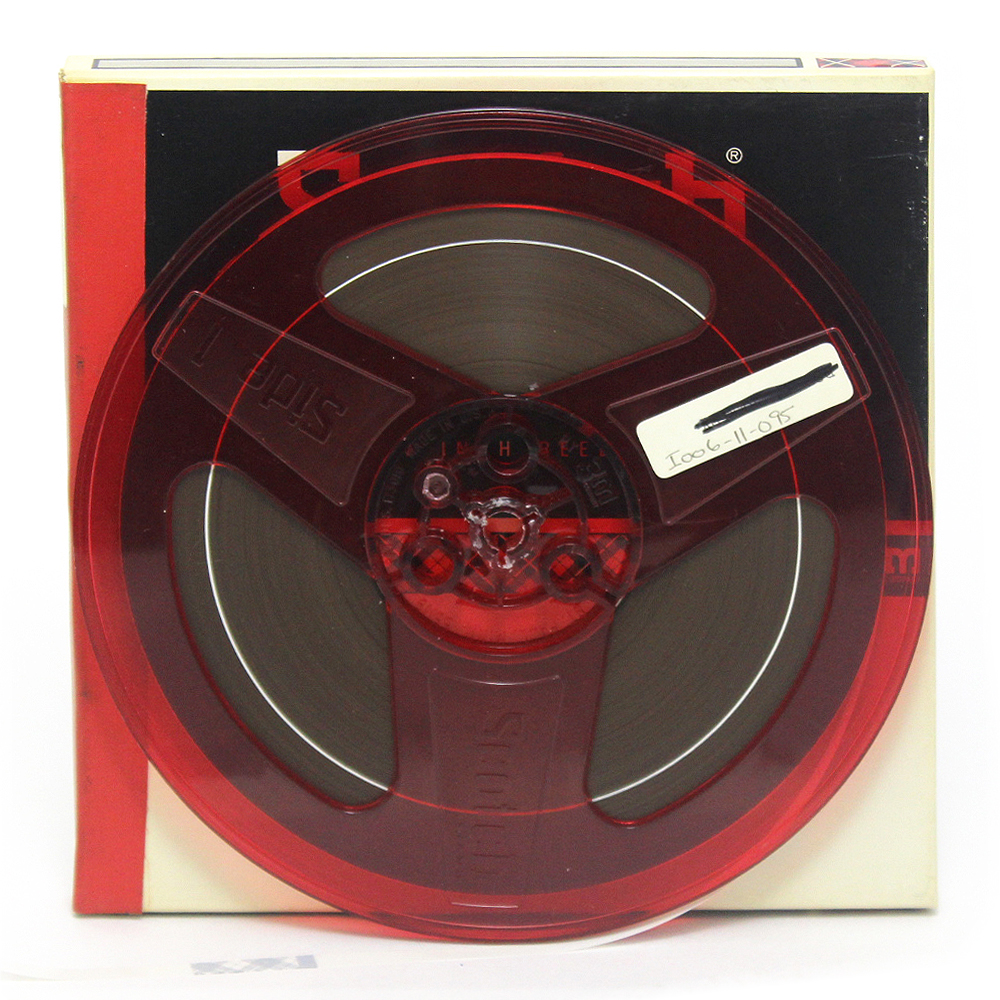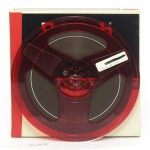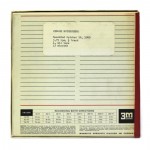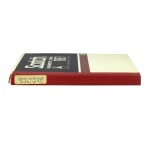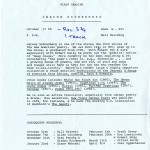Introducer - George Bowering
00:00:00.00
I'm glad we got this room. Welcome back to the first night of the fourth year of our series. [shuffling noise] And for those of you who are here for the first time, welcome you too. I'm really glad that we could start off with Jerome Rothenberg, especially from my own personal viewpoint, because while Jerome Rothenberg is one of the names that I've paid a lot of attention to, and one of the names that poets have paid attention to over the last decade, this'll be the first time that I've been able to hear him read, too. Usually when, often when us people from the West think about the New American Poetry, we tend to think of it in terms of people from outposts such as New Mexico, and Utah, and San Francisco, and so on. And we forget that New York City is one of the centre-place, central-places, so that it can produce poets such as Joel Oppenheimer who will be here in the following spring, and Paul Blackburn, who was here a couple of years ago. Jerome Rothenberg has always been the centre, in the centre of that scene, and not only as one of the principal poets, but as editor, and publisher, and so on and so forth, specially with a very important magazine of the 1960's called Some CH Oblique Thing [unknown spelling or reference.] And he's especially interesting to me too because of the kind of work that produced a book such as Technicians of the Sacred, a compilation of the poetries from various oral traditions around the world, and a similar sort of impulse has always been at the centre of his work too. I'd also like to correct a mistake on the little printed page that wasn't really mine, that I picked up from somewhere else and couldn't quite believe myself, that said that Jerome Rothenberg was born in 1921. All I can say is that he was born sometime between the death of Lord Byron and now [Laughter.] But I'm pretty certain that he wasn't around in 1921. So I'd like you to give a welcome to Jerome Rothenberg.
Annotation
00:02:53.39
Applause.
Jerome Rothenberg
00:02:58.58
The birthdate'll come clearer in the second part of the reading. I'll read in two parts. And in the first set, what I'll be reading are translations and re-workings of American Indian poetry, which have been important to me over the last five or six years. And I'll start with some which are based on earlier translations, re-workings of material previously translated, and then as I get into it, some translations that result from direct contact and direct experience of American Indian poetry. This is an Aztec poem. The first four or five, six poems will be Aztec or Mexican in origin, and the theme will be flowers. "Offering Flowers."
Annotation
00:04:24.68
Reads "Offering Flowers." [INDEX: translation, Aztec, Mexico, flower, feast, offering, morning, temple, spiritual, god, dance, repetition, anaphora, food, drink, word]
Jerome Rothenberg
00:07:37.94
This is Aztec, too, in origin, translated through the Spanish.
Annotation
00:07:52.19
Reads “A Song of Chalco”. [INDEX: rose, fire, god, house, bird, thrush, song, poet, forest, flower, dance, lust, father, prince, joy, son, body, river]
Jerome Rothenberg
00:09:53.57
And it doesn't die out, even with the destruction that follows, and flowers are picked up again, this in a series of translations, again through the Spanish, of a series of Peyote songs, from the Huichol Indians of central Mexico. The name Wirikota is the name given to the place of the gods, and the spiritual place of the Peyote. The Peyote is described as the rose, it's described as the corn, the maize, it's described under a number of images, and through the figure, the mythological figure of one called the Blue Stag. This is the first Huichol, Peyote song.
Annotation
00:10:46.51
Reads “First Peyote Song”. [INDEX: rose, birth, flower, wind, eternal, god, mountain, mother, house, heart, Peyote, Blue Stag, rain, maize, earth, Aztec, Mexico, song]
Jerome Rothenberg
00:11:46.19
"Song of an Initiate."
Annotation
00:11:51.53
Reads "Song of an Initiate" [INDEX: rose, song, god, stair, sky, silence]
Jerome Rothenberg
00:12:25.05
And this is a poem called "How the Violin Was Born" -- a Peyote account.
Annotation
00:12:35.51
Reads "How the Violin was Born" [INDEX: music, violin, wood, cedar, stone, tree, heart, soul, Big Stag, bird, song, wind]
Jerome Rothenberg
00:13:24.38
These are a few short Indian pieces. Not poems but part of what's connected with the whole activity of poetry, among the tribal peoples. Which is more than an activity of words; which goes beyond language. And these are the events that accompany the words. And the first is an Iroquois dream-event.
Annotation
00:13:58.00
Reads ["After having a dream"] [INDEX: aboriginal, dream, community, interpretation, theatre]
Jerome Rothenberg
00:14:08.59
These are a series of vision-events. The first two are Eskimo.
Annotation
00:14:14.30
Reads "Vision Event I" [INDEX: aboriginal, Eskimo, solitude, stone, circle, place, time, ritual]
Annotation
00:14:25.39
Reads "Vision Event 2" [INDEX: aboriginal, Eskimo, vision, hanging, sight]
Jerome Rothenberg
00:14:39.46
And this is a Sioux Indian vision event.
Annotation
00:14:43.08
Reads "Vision Event 3" [INDEX: American Indian, aboriginal, vision, crying, sight]
Jerome Rothenberg
00:15:01.17
This is a Kwakiut'l Indian gift event. All the words are from Kwakiut'l Indians. It's either spoken in English or translated into English. The Kwakiut'l, like other Northwest Coast people, celebrate the potlatch, you know, which is not always terrible or distasteful in its consequences. This is benevolent gift-giving.
Annotation
00:15:26.02
Reads "Gift Event" [INDEX: Kwakiut'l, giving, gift, potlatch, Northwest, coast, aboriginal, animal, ritual, house, sound, value, name]
Jerome Rothenberg
00:16:32.01
These are a series of seven Navajo animal songs.
Annotation
00:16:42.41
Reads "Seven Navajo Animal Songs" [INDEX: animal, chipmunk, action, movement, mole, sex, wildcat, water, turkey, madness, scatological, pinion jay, bird]
Jerome Rothenberg
00:17:49.80
The next few are from a series of translations I've been doing, are called, well, it's the Seneca Indian word for one of their major curing ceremonies, a term for a major curing ceremony, "Shaking the pumpkin," because the pumpkin rattle, the big pumpkin rattle is the major instrument used in this. Or it's got a more ornate name, it's called "The Society of the Mystic Animals." The man, Richard Johnny-John, Indian, who is working with me on this, explained it's a serious ceremony, he said, but if everything's alright, the one who says the prayer tells them, I leave it up to you, folks, and if you want to have a good time, have a good time. Well everything's alright in the translations, you know, so one eases up there. The translations are done trying to follow everything in the Seneca, including the meaning of the sounds, the hey-ya and the way-oh-hey, that are very common in Indian poetry. Basically the way I do it is to present them visually on the page, and I can't do this in reading them, so I'm just going to select out of this poems that read easily. The purpose is curing, and well-being.
Annotation
00:19:34.40
Reads "Caw-Caw the Crows Caw-Caw: Two Songs" [INDEX: Seneca, aboriginal, crow, movement]
Annotation
00:19:49.76
Reads "Two more about a crow, in the manner of Zukofsky" [INDEX: Louis Zukofsky, sound, Seneca, aboriginal]
Jerome Rothenberg
00:20:05.75
Three poems about the owl, on the page, the vocables, the sounds, make the figure of an owl, even as in the singing of the song, the sound of the owl comes through. But here are just the words.
Annotation
00:20:19.99
Reads "The Owl: One" [INDEX: Seneca, aboriginal, owl, home, tree, hemlock]
Annotation
00:20:25.79
Reads "The Owl: Two" [INDEX: Seneca, aboriginal, cure, sickness, poison, owl]
Annotation
00:20:32.33
Reads "The Owl: Three" [INDEX: Seneca, aboriginal, owl, tree, sound, whistle]
Jerome Rothenberg
00:20:40.12
"A Song of My Song," in three parts.
Annotation
00:20:45.77
Reads "A Song of My Song" [INDEX: song, distance, circle, room, proximity, sound]
Annotation
00:20:59.38
Reads “Three Ways to Screw Up on Your Way to the Doings”.
Jerome Rothenberg
00:21:16.20
Buckets are important, to bring back soup and...The last one from this series.
Annotation
00:21:31.78
Reads “Where the Song Went Where She Went & What Happened When they Met”.
Jerome Rothenberg
00:22:15.92
The next are a little harder to do, but I hope I make it. The Senecas don't use many words. It's a kind of minimal poetry and the power is in the compression. The Navajos use more words, the poetry gets dense, and in addition they use many many non-verbal sounds. And in addition, they distort many of the words in the singing. So that if you translate just for the meaning, you're only getting a small part of what the Navajo is doing. And then in addition, everything is sung in the Navajo. So I began to translate a series called, because that's what they are, "The Seventeen Horse Songs of Frank Mitchell." Seventeen horse-blessing, horse-curing songs that were the property of a Navajo medicine man named Frank Mitchell. And the problem that came up for me, I couldn't translate just for meaning, I wanted to, you know, consider all of the factors that went into the poem. So I began to insert sounds corresponding to the sound of the English words as the Navajo had the meaning of the sounds, and to distort the words. And then it seemed to me that it was necessary to carry this further, to begin to sing the songs as well. Which came to me with great difficulty. But I've gotten through a number of them now, and what I'll do is sing one, the "Tenth Horse Song of Frank Mitchell," and then do a tape for three voices of another one of the horse songs. You'll notice the words are rather similar from one to another, the melody changes. In this, and the Navajos of course would know this, the hero, Enemy-Slayer, has gone to the house of his father, the sun up there, to bring back horses for the people. And in this Tenth Horse Song, it's mostly the father, the sun, speaking, telling him to bring the horses back to the house of his mother, you know, who everybody understands to be Changing Woman. Bring it back to the earth. And sometimes the voice of Enemy-Slayer comes into it. But the basic refrain is to "go to the woman, go to her."
Annotation
00:25:24.31
Reads/sings "Tenth Horse Song of Frank Mitchell"
Annotation
00:31:25.59
Applause from audience.
Jerome Rothenberg
00:31:38.92
The next one, and I guess the last piece in the first set, is the "Twelfth Horse Song of Frank Mitchell." The melody changes. Some of the distortions change. The burden changes, and now Enemy-Slayer contemplates the horses coming back to earth with him, in the same sequence. This is done on tape, with three voices. I think that's about all there is to say about it. Three voices.
Annotation
00:32:23.16
Plays recording of "Twelfth Horse Song of Frank Mitchell," sung by three voices.
Annotation
00:39:42.20
Applause from audience.
Jerome Rothenberg
00:39:48.20
In fact, let me end this set with a live poem, I don't want to end with a machine. This is another Aztec poem called "The Flight of Quetzalcoatl." The plumed serpent, bird-snake man. In which he discovers that he's become old, and leaves and goes on a long journey, and is reborn as the morning star.
Annotation
00:40:39.53
Reads "The Flight of Quetzalcoatl"
Annotation
00:47:17.41
Applause from audience.
Annotation
00:47:20.11
Cut/edit made in tape; unknown amount of time elapsed.
Introducer - George Bowering
00:47:20.56
Okay, we'll hold for about ten minutes, and open the doors and get cool, and then come back.
Annotation
00:47:27.02
First CD of digitally-transferred recording ends.
Jerome Rothenberg
00:47:27.02
The second set will be a straight reading, whatever that means, from a long series of poems called "Poland 1931." A series of ancestral poems. So Poland is where the ancestors come from, for some number, hundreds of years. And that is Jewish Poland. And 1931, rather than 1921, is the year of my birth. And it's in a sense, though I don't keep to it too strictly, everything before that. To try to build up a world that I really don't know.
Annotation
00:48:29.38
Reads "Poland, 1931: The Wedding"
Annotation
00:50:46.06
Reads "Poland, 1931: The King of the Jews"
Jerome Rothenberg
00:51:52.65
The next one's called "The Key of Solomon." It's the name of a medieval, a series of medieval magical books that were supposed to go back to the times of Solomon.
Annotation
00:57:07.31
Reads "Poland, 1931: The Key of Solomon"
Jerome Rothenberg
00:53:42.35
"The Beetle's Testimony." Because beetles were a demon.
Annotation
00:53:47.99
Reads "Poland, 1931: The Beetle's Testimony"
Annotation
00:54:53.93
Two poems called "Soap."
Annotation
00:54:57.63
Reads "Soap I"
Annotation
00:55:56.62
Reads "Soap II"
Annotation
00:57:37.79
Reads "Poland, 1931: The Rabbi's Testimony"
Annotation
00:59:08.60
Reads "Poland, 1931: The Connoisseur of Jews"
Annotation
01:00:38.47
Reads "Poland, 1931: The Beards"
Annotation
01:03:32.03
Reads "Poland, 1931: The Mothers I"
Annotation
01:04:08.64
Reads "Poland, 1931: The Mothers II"
Annotation
01:04:43.04
Reads "Poland, 1931: The Mothers III"
Annotation
01:05:19.99
Reads "Poland, 1931: Milk and Honey I"
Annotation
01:06:00.45
Reads "Poland, 1931: Milk and Honey II"
Annotation
01:06:31.29
Reads "Poland, 1931: Ancestral Scenes"
Annotation
01:07:09.03
Reads "Poland, 1931: The Fathers"
Jerome Rothenberg
01:09:10.95
This one is called "Portrait of the Jew, Old Country Style"
Annotation
01:09:16.25
Reads "Poland, 1931: Portrait of the Jew, Old Country Style"
Jerome Rothenberg
01:11:51.66
This is a longer one, called "The Student's Testimony"
Annotation
01:12:04.88
Reads "Poland, 1931: The Student's Testimony"
Jerome Rothenberg
01:17:49.95
A somewhat shorter one, and then another long one, and then a quite short one and that's...that's it.
Annotation
01:17:58.50
Reads "Poland, 1931: The Brothers"
Annotation
01:20:10.87
Reads "Poland, 1931: The Steward's Testimony"
Jerome Rothenberg
01:25:20.39
Now, I'll end it with, I'll end it with two poems. "A Poem for the Christians." It's partly to...[Laughter] ...it's a found poem from the prayer book. But you can see where there are changes, you know. [Laughter]
Annotation
01:25:42.99
Reads "A Poem for the Christians"
Annotation
01:26:45.75
Reads "Fish and Paradise"
Annotation
01:27:32.60
Tape ends suddenly. Unknown if final poem is concluded on recording. Reading ends with the line, "There are enough fish here to keep everyone alive."
